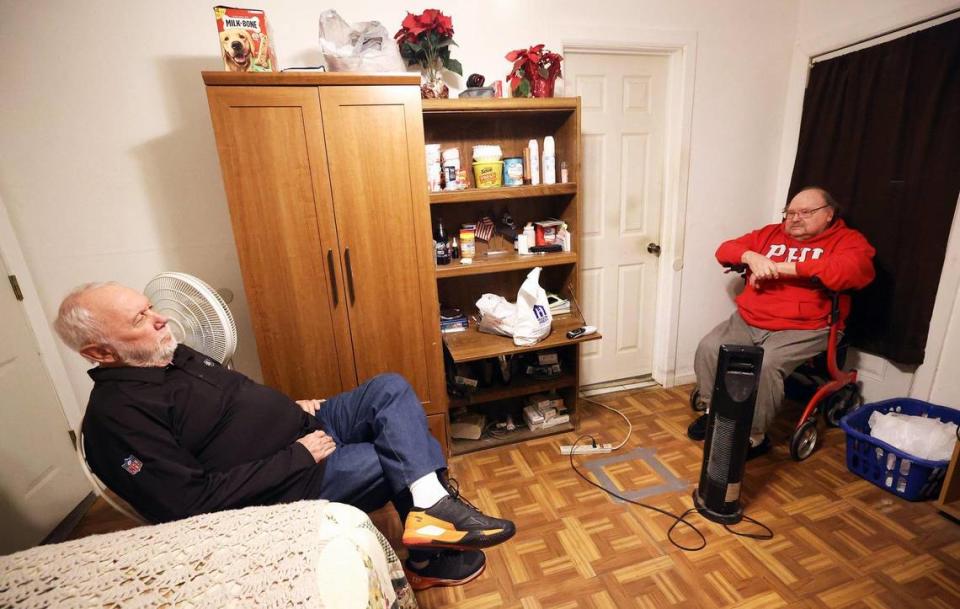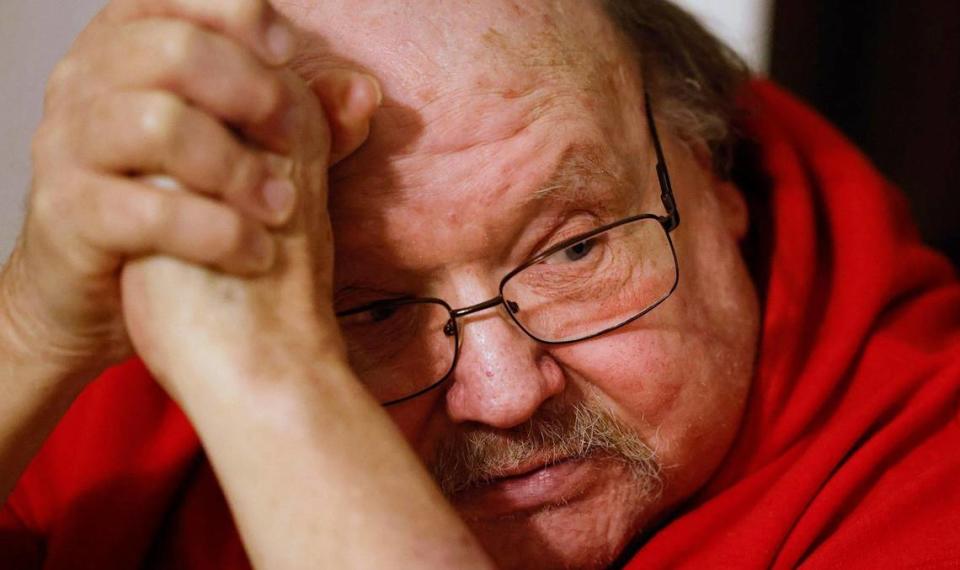Lonely after the loss of his wife, this Fort Worth man found a special friendship
Every Monday morning, in a small mother-in-law apartment in west Fort Worth, Paul Angstadt hosts a visitor: His friend Dave Friant.
Angstadt and Friant will talk about church, or politics, or the latest Eagles or Phillies game. (Both are natives of the Philadelphia area.)
The meeting doesn’t seem particularly remarkable, but it is. Before Angstadt and Friant met each other, Angstadt spent most Monday mornings — and many other mornings — alone.
Angstadt, 68, and Friant, 72, were connected through a program that partners Meals on Wheels’ clients with a volunteer who can spend an hour or so of purely social time with them. It’s designed to counteract the social isolation that many older adults face as they age, and the negative health impacts that come with that isolation.
It helps people like Angstadt find a friend, without whom, Angstadt said, life would be boring.
“It takes the monotony away from looking at the four walls all the time,” he said.

In May, U.S. Surgeon General Vivek Murthy declared an epidemic of loneliness in the U.S., and highlighted loneliness and social isolation as health risks as serious as smoking or diabetes. Older adults are one of the groups most at risk for social isolation, which is defined as an objective measure of the number and nature of one’s social relationships. (Loneliness, on the other hand, is a subjective metric, measured by an individual’s own sense of how lonely they feel.) The surgeon general’s report urged a greater focus on how individuals and communities can improve their relationships with other people and their sense of connection.
Programs like Meals on Wheels’ friend-to-friend program, as it is known, can help people build new relationships that are meaningful. Older adults are at greater risk of being socially disconnected because of a range of factors that often come with age.
Of adults age 65 and older who live in the community (and not in a congregate setting like a nursing home), about one in every four lives alone, according to federal data. Older adults are also more likely to have experienced a loss of a loved one, like a spouse or close friend, or to have a chronic health condition or mobility challenges.

Angstadt’s wife died in 2013, and he’s lived alone ever since. He also grapples with a number of chronic conditions, and can’t drive a car because of a history of diabetic seizures, he said. Before he met Friant, Angstadt typically only left his apartment when a friend gave him a ride to church or to a doctor’s appointment.
All of these factors made meeting new people or continuing to see old friends more challenging for Angstadt. When he joined the Meals on Wheels’ friends program, a friend came to him.
“If somebody was in my same boat, I say that they should join this program, because it really, really helps,” Angstadt said. His relationship with Friant “helps me realize what I was missing.”
Now, sometimes Angstadt or Friant will get lunch together, or Friant will give his friend a ride to the doctor’s. Once, they saw their hometown Phillies play the Texas Rangers at Globe Life Field.
There are 36 Meals on Wheels clients who participate in the program, said Belinda Reed, the program’s director. Most of these clients are largely homebound, and expressed feeling lonely or wanting more support to their Meals on Wheels’ case worker. The program first started at Tarrant County’s Meals on Wheels in 2018, but paused during the first two years of the pandemic before resuming in 2022, Reed said. Everyone who participates talks with Reed quarterly about how their new friend has affected their mood and well-being.
Today, the majority of the Meals on Wheels affiliates throughout the U.S. have some kind of program that targets social isolation in older adults.
But less more work needs to be about what entire communities can do to increase social connection, said Matthew Lee Smith, an associate professor at Texas A&M University’s school of public health.
“Most of what we know is based on individual-level interventions,” Smith said. “We know the bigger impact is going to be to create more inclusive communities.”
But community-level interventions, like increasing public spaces where people can meet, providing transportation to those spaces, and increasing people’s sense of belonging to a community, are more resource intensive and time consuming to undertake and study, said Smith, who has a Ph.D. in health education.
Although some programs have attempted to increase social connection for older adults, there is an urgent need for more work to be done, according to the surgeon general’s advisory. Both loneliness and social connection have negative impacts across a range of health outcomes. In particular, dozens of studies have shown a connection between social connection and the risk of heart disease or stroke. One study found that heart failure patients who reported high levels of loneliness had a 68% increased risk of hospitalization and a 57% higher risk of emergency department visits.
“There are fewer interventions specifically created for social connection than there are for other topics, like disease management or fall prevention,” Smith said. Researchers and policy makers, he said, need to implement and study these interventions to determine what works as the population of older adults in America continues to grow.
After his wife died in 2013, Angstadt remembers entering his home and realizing there was no one there to share it with. He saw his empty bed, and realized no one was coming in the door behind him. It was just him.
“I’m thinking to myself, ‘How am I going to make it?’” he recalled. “I thought I heard a voice that said, “You can do it.’”
Angstadt doesn’t know if it was his wife who told him he could make it, or if it was God. But either way, he said proudly, he made it. As Angstadt recounts this story, Friant sits across from him, smiling at his friend.
How to get involved
If you’d like to volunteer with Meals on Wheels’ friend-to-friend program, you can visit their website at mealsonwheels.org or call 817-258-6475. Volunteers must pass a background check and go through a training before they start working with clients.

